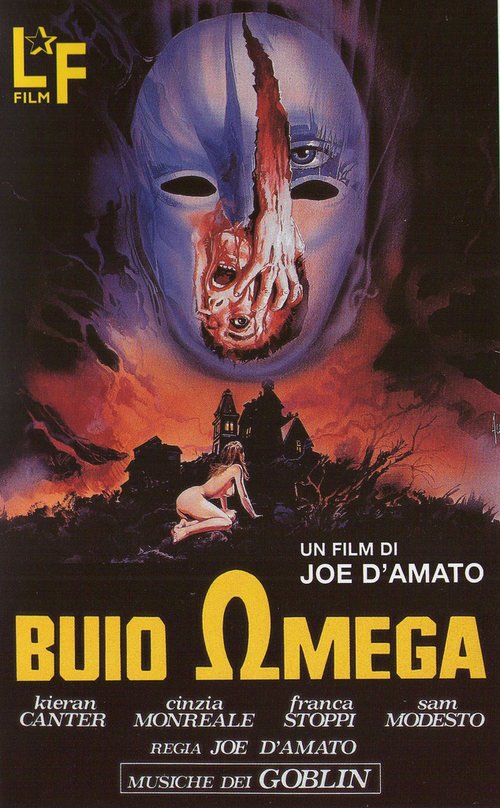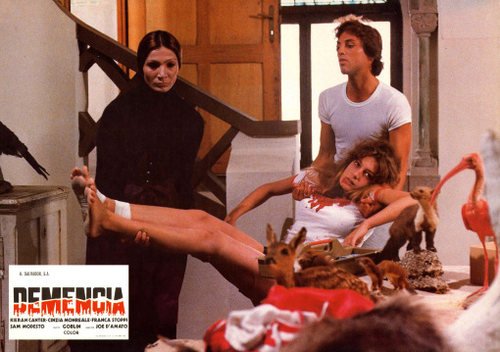BEYOND THE DARKNESS: Descent Into The Deviant A La D'Amato
Aristide Massacessi, best known by his pseudonym Joe D'Amato, is perhaps the most fearless of directors to emerge from the Italian horror/exploitation scene of the '70s and '80s. A highly skilled cameraman who turned to directing, he made his name with the mid-'70s Black Emanuelle sexploitation series that became a Skinemax staple in the '80s.He soon distinguished himself from the pack of Italian exploiteers with his willingness to go to extreme, often dark places. He was dabbling in hardcore pornography as early as the mid-to-late '70s (he spent most of his final decade of his career making it exclusively) and also made a string of horror films that delved into perverse, blood-drenched taboo territory. Sometimes he even mixed both with titles like the infamous Porno Holocaust. In horror/grindhouse circles, Beyond The Darkness is considered to be one of his signature achievements in celluloid deviancy. One critic once described it as "a necrophiliac soap opera" and that's not far from the mark. The plot focuses on Frank (Kieran Canter), an orphaned rich kid who lives with his longtime maid/ex-nanny, Iris (Franca Stoppi). Their home is all kinds of weird: he's into taxidermy and mortician work and she has a creepy, pseudo-incestuous desire to own him romantically.Despite this weirdness, Frank manages to have a girlfriend (Cinzia Monreale) - but she's ill and Iris utilizes some rural Italian voodoo to bump her off. Frank uses his embalming skills so he can keep her around. Iris protects his secret but he goes further around the bend, picking up women and going into a homicidal rage when they don't understand his relationship with his dead girlfriend. Perversion, bloodshed, mortuary science and plot twists ensue as D'Amato keeps topping himself in the taboo-busting department.There are Italian films from the era that are more explicit in terms of sex and violence but few can approximate the stifling atmosphere of perversity that Beyond The Darkness creates. It's played straight, with the only bits of humor being of the pitch-black variety. Both Canter and Stoppi give obsessive, committed and intense performances: neither could be called realistic but they fit the film's squalid, surreal mood perfectly. The story is kept intimate in scale so there's no way for the viewer to mentally check out of the bleak proceedings.
In horror/grindhouse circles, Beyond The Darkness is considered to be one of his signature achievements in celluloid deviancy. One critic once described it as "a necrophiliac soap opera" and that's not far from the mark. The plot focuses on Frank (Kieran Canter), an orphaned rich kid who lives with his longtime maid/ex-nanny, Iris (Franca Stoppi). Their home is all kinds of weird: he's into taxidermy and mortician work and she has a creepy, pseudo-incestuous desire to own him romantically.Despite this weirdness, Frank manages to have a girlfriend (Cinzia Monreale) - but she's ill and Iris utilizes some rural Italian voodoo to bump her off. Frank uses his embalming skills so he can keep her around. Iris protects his secret but he goes further around the bend, picking up women and going into a homicidal rage when they don't understand his relationship with his dead girlfriend. Perversion, bloodshed, mortuary science and plot twists ensue as D'Amato keeps topping himself in the taboo-busting department.There are Italian films from the era that are more explicit in terms of sex and violence but few can approximate the stifling atmosphere of perversity that Beyond The Darkness creates. It's played straight, with the only bits of humor being of the pitch-black variety. Both Canter and Stoppi give obsessive, committed and intense performances: neither could be called realistic but they fit the film's squalid, surreal mood perfectly. The story is kept intimate in scale so there's no way for the viewer to mentally check out of the bleak proceedings. D'Amato shows a similar single-mindedness in the director's chair, making lengthy setpieces out of nasty events like an embalming and a sequence where a murder victim is stripped, dismembered and dissolved in acid. The time spent on these events and the use of an audience identification figure in each moment forces the audience to think about the awful things they are witnessing. In doing so, D'Amato forces the viewer into lockstep with his twisted antiheroes, inducing a "trapped" feeling that makes the nastiness hit harder.Surprisingly, the filmmaking capturing these sordid events is often lovely. D'Amato was praised by his contemporaries for his photographic skill and he shows it off here, handling the cinematography himself. The results are lit and shot with great care, boasting carefully composed frames and precise camera moves that blend visual economy with a glossy style. Along similar lines, the rural Italian locations look the setting for an arthouse film and the score by Goblin is hypnotic yet tranquil. The tension between the grim subject matter and the film's artful techniques is yet another element that adds to its enormously unsettling mood.In short, Beyond The Darkness is the kind of film you really have to be in the mood for... but if you're feeling brave, it shows off the twisted artistry of Joe D'Amato to bracing and memorable effect.Blu-Ray Notes: anyone with a serious interest in this film should get the special edition set that Severin Films released in 2017. It improves substantially on past editions with a fresh transfer and offers an array of interviews, an hour-long retrospective piece on D'Amato and a bonus CD of the film's excellent Goblin score.
D'Amato shows a similar single-mindedness in the director's chair, making lengthy setpieces out of nasty events like an embalming and a sequence where a murder victim is stripped, dismembered and dissolved in acid. The time spent on these events and the use of an audience identification figure in each moment forces the audience to think about the awful things they are witnessing. In doing so, D'Amato forces the viewer into lockstep with his twisted antiheroes, inducing a "trapped" feeling that makes the nastiness hit harder.Surprisingly, the filmmaking capturing these sordid events is often lovely. D'Amato was praised by his contemporaries for his photographic skill and he shows it off here, handling the cinematography himself. The results are lit and shot with great care, boasting carefully composed frames and precise camera moves that blend visual economy with a glossy style. Along similar lines, the rural Italian locations look the setting for an arthouse film and the score by Goblin is hypnotic yet tranquil. The tension between the grim subject matter and the film's artful techniques is yet another element that adds to its enormously unsettling mood.In short, Beyond The Darkness is the kind of film you really have to be in the mood for... but if you're feeling brave, it shows off the twisted artistry of Joe D'Amato to bracing and memorable effect.Blu-Ray Notes: anyone with a serious interest in this film should get the special edition set that Severin Films released in 2017. It improves substantially on past editions with a fresh transfer and offers an array of interviews, an hour-long retrospective piece on D'Amato and a bonus CD of the film's excellent Goblin score.


